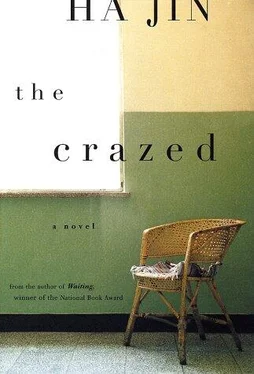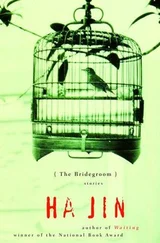“Come on, it’s just orangeade. See, I also drink some myself.” I lifted the spoon to my mouth and made a gurgling sound as a parent would do to convince a child. “Ah, it’s so delicious. Please try it, just a small cup.”
He said, “You slipped ratsbane into it, didn’t you? I know your dark fat heart.”
“No, you’re wrong. Please have some!”
“I won’t.”
Hesitantly I used the spoon to pry his mouth open, but his teeth were clenched, and the steel scraped them noisily. I was afraid this might hurt his gums, so I stopped, wondering what to do. He jabbed his elbow at the cup in my hand, and a splash of the drink fell on the sheet and left a yellow stain. His mouth was sealed up like a startled clam.
I wouldn’t give up and raised half a spoonful of the orangeade to his lips again, begging him, “Please try this. It will do you good. I just want to feed you and won’t hurt you.”
“No, I won’t. You cannot cajole me anymore.”
“Please, just a sip.”
“No, that will be lethal.”
Out of patience, I shouted, “Look at me! You don’t recognize me? Do I look like a murderer? I’m Jian, your future son-in-law.” I said the last word diffidently, but thrust my face in front him. His eyes opened a crack, then fully.
“Oh,” he muttered, “I didn’t know I had a son.”
“This is Jian Wan, remember me?”
“I didn’t know it was you. What is it that you want?”
“I’d like to feed you. Here’s a small cup of orangeade, please open your mouth.”
Miraculously, he obeyed me like a well-behaved child. I carefully put the spoon into his mouth and turned it over. Slowly he swallowed the juice, his Adam’s apple bobbing.
“I like the tangy flavor. It tastes excellent,” he said.
“Sure it does,” I agreed.
“What did you put in it?”
“Nothing.”
With less than ten spoonfuls I emptied the cup. I told him, “Don’t be afraid. I’m here with you and won’t let anyone hurt you. Now you should have some sleep.”
Shamefacedly he watched me as I tried to move his half-paralyzed body; he even tried to shift his hips a little to facilitate my effort. Still, I had to exert myself hard. When I had finally put him back into bed, I was huffing and puffing.
A few minutes later he went to sleep.
I didn’t expect that Banping and his wife, Anling, would make flounder dumplings. This was the first time I had eaten this dish, which my host told me was a delicacy in some coastal areas for celebrating spring. The stuffing was juicy and toothsome, tasting like prawn. It made me miss the fat catfish, long pike, and stout carp from the lower reaches of the Songhua River in the Northeast, where my parents lived.
While we were eating, Banping bragged about his cookery. He had prepared the filling, seasoned with leeks and crushed sesame seeds. He even described to us how to debone the large flounder, how to peel its skin, and how to get rid of its blood so as to reduce the fishy taste, but Anling accused him of “cooking only with his mouth.”
“Come on, don’t be so mean,” Banping said to her. “Didn’t I work the whole afternoon?”
“You help only when we have good stuff to cook.”
“That’s because I’m like a chef.”
“So I’m just a kitchen maid who only chops vegetables and does dishes in this home?”
“Uh-oh,” I stepped in, “you’re both chefs, of the first rank, all right?”
We all laughed.
“Don’t you have other music? This is too loud,” Weiya said to Banping, referring to the Beethoven that his cassette recorder was playing. I too felt uncomfortable; the symphony was so overpowering it seemed to be urging us to compete in wolfing down the food. Banping worshiped Beethoven and regarded Romain Roland’s Jean-Christophe as his bible. Inspired by the biographical novel, he often talked about the joy of life. To my thinking he was too optimistic.
He got up and put a tape of popular songs into the player. Things eased up immediately.
I noticed that under the washstand, welded of iron bars, sat a new electric stove, at least 1,500 watts strong, which was strictly prohibited in the dorms because of the drain on the electricity. In fact, a top school official, Vice Principal Huang, was in charge of catching users of electric stoves, teapots, immersion heaters, and cookers. He would personally spot-check dormitory houses and buildings, especially in the late afternoons.
“Boy, you want to appear on the honor roll again,” I said to Banping, alluding to the list of “electricity thieves” often posted on the bulletin board at the front entrance to campus.
“I told him to be more careful,” Anling picked up.
“As long as they don’t fine me, I won’t mind,” Banping said, exhaling smoke.
“My roommate was caught last Friday,” put in Weiya.
“Was she fined?” I asked.
“No, she’s a first-time offender.”
In reality, Banping was afraid of being caught. On the back of his right foot was a burn scar in the shape of a tangerine segment, caused by a splash of boiling broth. One afternoon the previous fall, as he was stewing chicken and taros on an electric stove, suddenly somebody had pounded on the door. “Open it!” came Vice Principal Huang’s raucous voice. Hurriedly Banping hid away the stove under his bed, pushed the window open, then went to answer the door. The leader stepped in, sniffing the meaty air. At the sight of the wire and plug on the floor, he bent down and pulled the whole thing out from under the bed. The pot overturned. “Ouch!” Banping yelled, hopping on one leg; some broth had spattered on his foot. Chunks of chicken and taros were scattered on the concrete floor, and the room at once became steamy. Though the “electricity thief” was in pain, the vice principal dressed him down and confiscated his stove. Later Secretary Peng interceded for Banping with Huang’s office, saying his scalded foot was already an indelible lesson to him; otherwise, by rule, he’d have been fined fifty yuan.
Weiya sat opposite me at the square table and looked pensive. Throughout dinner she seldom smiled; her mouth closed without showing her eyeteeth as she would do when she was happy. Her luxuriant hair, held by two orange barrettes, was slightly tousled. Her egg-shaped face had lost its usual pink, though she was wearing a cherry-red shirt that should have given her cheeks more color. I had never seen her eyes so lazy. She had a high nose and almond-shaped eyes, which usually were vivid and bright but today were bleary with sadness. Even her voice sounded cheerless and rather whispery. Our teacher’s stroke must have affected her deeply. Although already thirty-one, she looked to be in her early twenties; some people in the Literature Department often referred to her as an old maid; I often wondered why she didn’t have a boyfriend and why she never seemed in a hurry to look for one. With her looks and intelligence, she should have had no difficulty in finding a suitable man.
Upset as we all were, we felt lucky in a way, because we were going to graduate soon; if not, with Mr. Yang hospitalized, the three of us would have been transferred into other professors’ hands as “foster children.” We also talked about the prognosis in Mr. Yang’s case. Banping said that normally it would take a whole year for a patient with cerebral thrombosis to convalesce, that most stroke victims couldn’t recover completely, and that some had to move around with the aid of a crutch for the rest of their lives.
After we were done with the dumplings and cleared the table, Banping brewed a pot of jasmine tea. We started talking about the possible causes of Mr. Yang’s stroke. We believed that apart from his pathological condition, something else might have set off his collapse. We all offered our guesses. Weiya suggested something I hadn’t thought of before. She told us that Secretary Peng had pestered Mr. Yang continually ever since he had returned from Canada. “I’ve heard that the school demands he pay the money back,” she said rather mysteriously.
Читать дальше

![Lao Zi - Dao De Jing [Tao Te Ching] (english)](/books/3890/lao-zi-dao-de-jing-tao-te-ching-english-thumb.webp)
![Lao Zi - Dao De Jing [Tao Te Ching] (chinese)](/books/3891/lao-zi-dao-de-jing-tao-te-ching-chinese-thumb.webp)
![Lao Zi - Dao De Jing [Tao Te Ching] (espanol)](/books/3892/lao-zi-dao-de-jing-tao-te-ching-espanol-thumb.webp)







